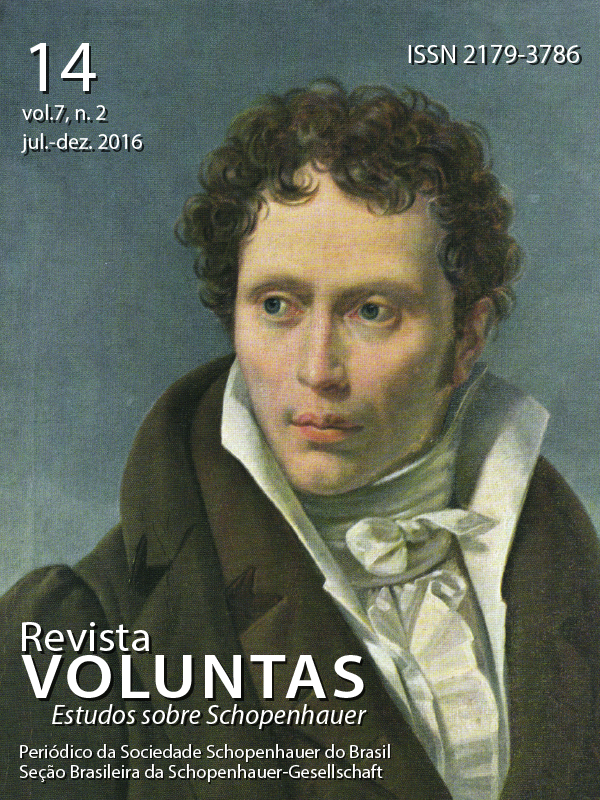O encontro de Schopenhauer com o pensamento indiano: influência e legitimidade
DOI:
https://doi.org/10.5902/2179378633700Palabras clave:
Schopenhauer, pensamento indiano, influência, legitimidadeResumen
O presente artigo tem como objetivo apresentar diferentes posicionamentos sobre o encontro de Schopenhauer com o pensamento indiano. A pergunta sobre a influência e a legitimidade desse encontro e alvo de debate entre indólogos e intérpretes de Schopenhauer e há mais de um século está longe de possibilitar uma única resposta.
Descargas
Citas
SCHOPENHAUER, Arthur. Sämtliche Werke. Hrsg. von Arthur Hübscher. 7 Bde. Wiesbaden: F. A. Brockhaus, 1972.
SCHOPENHAUER, Arthur. Der Handschriftliche Nachlaß. Hrsg. von Arthur Hübscher. 5 Bde. Frankfurt am Main: Verlag Waldemar Kramer, 1966-1975.
SCHOPENHAUER, Arthur. Gesammelte Briefe. Hrsg. von Arthur Hübscher. Bonn: Bouvier, 1987.
SCHOPENHAUER, Arthur. De la quadruple Racine du príncipe de raison suffisante. Librairie Phiposophique J. Vrin, Paris, 1991.
SCHOPENHAUER, Arthur. O mundo como vontade e como representação. Tomo I. Trad. Jair Barboza. São Paulo: Unesp, 2005.
SCHOPENHAUER, Arthur. Seis ensaios de Parerga e Paralipomena, pequenos escritos filosóficos. Trad. Rosana Jardim Candeloro. Porto Alegre: Editora Zouk, 2016.
ANQUETIL-DUPERRON (trad.). Oupnek’hat. 1801 (primeiro tomo) e 1802 (segundo tomo).
APP, Urs. Notes and Excerpts by Schopenhauer Related to Volumes 1-9 of the Asiatick Researches. Schopenhauer-Jahrbuch, Bd. 79, 1998, pp. 11-33.
APP, Urs. Schopenhauer’s India Notes of 1811. Schopenhauer-Jahrbuch, Bd. 87, 2006 pp. 15-31.
APP, Urs. Schopenhauer’s Initial Encounter with Indian Thought. Schopenhauer-Jahrbuch, Bd. 87, 2006, pp. 35-76.
BERGER, Douglas. A question of influence: Schopenhauer, Early Indian Thought and a Critique of Some Proposed Conditions of Influence. In: Schopenhauer and Indian Philosophy: a dialogue between India and Germany. Edited by Arati Barua. New Delhi: Northern Book Centre, 2008, pp. 80-117.
APP, Urs. "The Veil of Maya": Schopenhauer's System and Early Indian Thought. Binghamton: Global Academic Publishing, 2004.
CLARKE, J. J. Oriental Enlightenment: The Encounter Between Asian and Western Thought. London-New York: Routledge, 1997.
CROSS, Stephen. Schopenhauer’s Encounter with Indian Thought, Representation and Will and their Indian Parallels. Honolulu: University of Hawai’i Press, 2013.
DEUSSEN, Paul. Allegemeine Einleitung und Philosophie des Veda bis auf die Upanishad’s. Leipzig: F. A. Brockhaus, 1922.
DEUSSEN, Paul. Wie ich zu Schopenhauer kam. Schopenhauer-Jahrbuch, Bd. 1, 1912, pp. 13-18.
GESTERING, Johann Joachim. German pessimism and Indian philosophy: a hermeneutic reading. Delhi: Ajanta Publications: Distributors, Ajanta Books International, 1986.
GLASENAPP, Helmuth von. The Influence of Indian Thought on German Philosophy and Literature’, Calcutta Review 29, 1928, 203.
GOUGH, Archibald Edward. The Philosophy of the Upanishads and Ancient Indian Metaphysics. 3ª ed. London: Kegan Paul, Trench, Trübner & CO. Ltda., 1903.
HALBFASS, Wilhelm. India and Europe. Motilal Banarsidass Publishers PVT. LTD. Delhi, 1990.
HALBFASS, Wilhelm. Philology and Confrontation: Paul Hacker on traditional and Modern Vedanta. Albany, NY: State University of New York Press, 1995.
HECKER, Max F. Schopenhauer und die indische Philosophie. Ko ln, 1897.
JANAWAY, Christopher. Schopenhauer – Past Masters (1996).
JANAWAY, Christopher (Ed.). The Cambridge Companion to Schopenhauer. Oxford: Cambridge University, 1999.
KEITH, Arthur Berriedale. The Religion and Philosopy of the Veda and Upanishads. Delhi: Motilal Barsidass, 1976.
MOCKRAUER, Franz. Schopenhauer und Indien. Einleitende worte zu den ero rterungen u ber das thema Europa und Indien. Schopenhauer-Jahrbuch, Bd. 15, 1928, pp. 3-26.
NICHOLLS, Moira. The Influences of Eastern Thought on Schopenhauer’s Doctrine of the Thingin-Itself. In: The Cambridge Companion to Schopenhauer. Christopher Janaway (Ed.). Cambridge University Press, 1999, pp. 171-212.
SEDLER, Jean. India in the mind of Germany: Schelling, Schopenhauer and their times. Washington D.C: University Press of America, 1982
Descargas
Publicado
Cómo citar
Número
Sección
Licencia
La sumisión de los originales para este periódico implica la transferencia, por parte de autores, de los derechos de publicación impresa y digital. Los derechos autorales para los artículos publicados son del autor, con derechos del periódico sobre la primera publicación. Los autores sólo podrán utilizar los mismos resultados en otras publicaciones indicando claramente este periódico como el medio de publicación original. En virtud de ser un periódico de acceso abierto, está permitido el uso gratuito de los artículos en aplicaciones educacionales, científicas, no comerciales, desde que referenciada la fuente (por favor, vea la licencia Creative Commons en el pie de página de este periódico).






